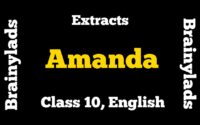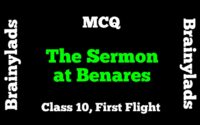Extracts of Glimpses of India | Class 10 | English | First Flight |
Table of Contents
Extracts of Glimpses of India | Class 10 English | First Flight |
Extract 1
During our childhood in Goa, the baker used to be our friend, companion and guide. He used to come at least twice a day. Once, when he set out in the morning on his selling round, and then again, when he returned after emptying his huge basket. The jingling thud of his bamboo woke us up from sleep and we ran to meet and greet him.
Q1. Name the chapter.
Ans : Glimpses of India
Q2. Who is the author of A Baker from Goa in Glimpses of India?
Ans : Lucia Rodrigues
Q3. What did the baker sell?
Ans : The baker sold loaves.
Q4. What does the word ‘Thud’ mean?
Ans : It means a loud and dull noise.
We would love your reading of Formal Letters, Notice Writing, Formal & Informal Invitation, Classified Advertisement, Debate Writing, Speech Writing, Article Writing, Report Writing, Note Making, Poster Making, Short Story Writing, Leave Application Writing, Descriptive Paragraph Writing for scoring higher in upcoming examination.
Extract 2
The baker made his musical entry on the scene with the ‘jhang, jhang’ sound of his specially made bamboo staff. One hand supported the basket on his head and the other banged the bamboo on the ground. He would greet the lady of the house with “Good morning” and then place his basket on the vertical bamboo. We kids would be pushed aside with a mild rebuke and the loaves would be delivered to the servant.
Q1. What woke the narrator and others up?
Ans : The jingling thud of the bamboo carried by the bakers woke the narrator and others up.
Q2. How would the baker recognise the lady of the house?
Ans : The baker greeted the lady of the house wishing her ‘Good morning’.
Q3. Find out the synonym of the word ‘Censure’ from the passage.
Ans : Rebuke
Q4. How did the bakers enter the village?
Ans : The bakers would make musical entry making sound with his bamboo.
Extract 3
The baker or bread-seller of those days had a peculiar dress known as the kabai. It was a single piece long frock reaching down to the knees. In our childhood we saw bakers wearing a shirt and trousers which were shorter than full-length ones and longer than half pants. Even today, anyone who wears a half pant which reaches just below the knees invites the comment that he is dressed like a pader.
Q1. Which literary device has been used in ‘He is dressed like a pader’?
Ans : Simile
Q2. Find out the synonym of ‘Unusual’ from the extract?
Ans : Peculiar
Q3. How did the bakers dress themselves in past?
Ans : They wore a shirt and trouser which were shorter than full-length ones and longer than half pants.
Q4. By what name was the bakers dress known?
Ans : It was known as Kabai.
Extract 4
These people married amongst the locals and their culture is apparent in the martial traditions, marriage and religious rites, which are distinct from the Hindu mainstream. The theory of Arab origin draws support from the long, black coat with an embroidered waist-belt worn by the Kodavus. Known as kuppia, it resembles the kuffia worn by the Arabs and the Kurds.
Q1. Who is the author of Coorg in Glimpses of India?
Ans : Lokesh Abrol
Q2. Who have been referred as ‘These people’?
Ans : Alexander Army
Q3. People of Coorg are believed to be the descent of…
Ans : Greek or Arabic
Q4. Find out the synonym of the word ‘Rituals’ from the extract.
Ans : The synonym of the word ‘Rituals’ is ‘Rites’.
Extract 5
Coorgi homes have a tradition of hospitality, and they are more than willing to recount numerous tales of valour related to their sons and fathers. The Coorg Regiment is one of the most decorated in the Indian Army, and the first Chief of the Indian Army, General Cariappa, was a Coorgi. Even now, Kodavus are the only people in India permitted to carry firearms without a licence.
Q1. Find out the synonym of the word ‘Bravery’ from the extract.
Ans : Valour
Q2. Where did the first Chief of Indian Army hail from/belong to?
Ans : Coorg
Q3. Who are allowed to carry firearms without license in India?
Ans : Kodavus
Q4. Who was the first Chief of Indian Army?
Ans : General Cariappa
Extract 6
“Well, there’s the one about the Chinese emperor who always boiled water before drinking it. One day a few leaves of the twigs burning under the pot fell into the water giving it a delicious flavour. It is said they were tea leaves.” “Tell me another!” scoffed Pranjol. “We have an Indian legend too. Bodhidharma, an ancient Buddhist ascetic, cut off his eyelids because he felt sleepy during meditations. Ten tea plants grew out of the eyelids. The leaves of these plants when put in hot water and drunk banished sleep.
Q1. Who is the author of Tea from Assam in Glimpses of India?
Ans : Arup Kumar Datta
Q2. What added taste to Chinese Emperor’s boiled water?
Ans : One day a few leaves of the twigs burning under the pot fell into the water giving it a delicious flavour. It is said they were tea leaves.
Q3. Find out the synonym of the ‘Abstainer’ from the passage?
Ans : Ascetic
Q4. What banished the sleep of Buddhist ascetic?
Ans : When the Buddhist ascetic drank the hot water after putting some leaves grown out of his eyelids, his sleep banished.
We would love your reading of The Making of a Scientist, Madam Rides the Bus, The Sermon at Benares, Glimpses of India, The Proposal, Bholi, The Necklace, The Hack Driver, Amanda, Animals & The Tale of Custard The Dragon for better understanding of the chapters/poems and scoring higher.
Related
Do share this post if you liked Extracts of Glimpses of India. For more updates, keep logging on BrainyLads


